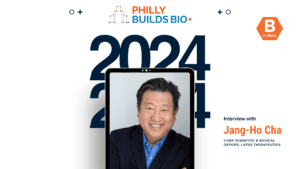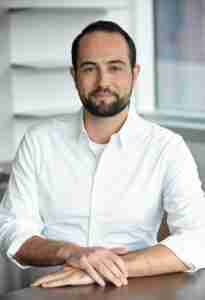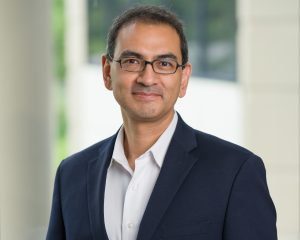
5 Questions with Lisa Tibbetts, Biomedical/Aerospace Researcher and Disabilities Advocate
“5 Questions With…” is a weekly BioBuzz series where we reach out to interesting people in the BioHealth Capital Region to share a little about themselves, their work, and maybe something completely unrelated. This edition features 5 Questions with Lisa Tibbetts, Biomedical/Aerospace Researcher, and Disabilities Advocate.
Lisa Tibbetts received a Master’s degree in Biotechnology from Georgetown University’s Department of Microbiology. She did her thesis in Usagi data mapping, pharmacovigilance, and artificial intelligence. She is also a graduate of Columbia University, Northwestern University, and Thomas Jefferson High School for Science and Technology and has worked in oncology, neurology, and most recently, satellite engineering.
1. Walk us through your education and career up to now.
I have been fortunate to be educated at Thomas Jefferson High School for Science and Technology, Northwestern, Columbia, and Georgetown, partially by loans and scholarships. My first loves were genetic cloning and astronomy. I enjoyed working in neurology at Columbia, where I contributed to a retrospective study for patients who battled the same disease that I do.
I worked in artificial intelligence to assist end-stage oncology patients in novel clinical trials at Perthera. At the Space and Naval Warfare Center, I researched satellite harmonization algorithms for global warming and climate change across a wide swath of disaster zones and natural disasters, such as wildfires and hurricanes.
2. You’ve been interested in laboratory research from a very young age. What about this space attracted you when you were a child?
My passion was incited in the eighth grade when I wrote a paper about Dolly the sheep, and then, I did wet laboratory research under Dr. Jim Du, at the Center for Marine Biotechnology in Baltimore, on a project that I designed myself that compared the genetic cloning of Astrodea to their asexual reproduction.
One of my earliest memories was being given a constellation globe after surgery and being taught about the radial velocities of the stars by my father, who minored in Astronomy at Northwestern. My family and I visited the Smithsonian’s Natural History and Aerospace Museums a few times a month when I was very young. This, coupled with early laboratory experiences in gene cloning, created the magic of science, for me.
3. What has been the most fulfilling part of your career so far? And what advice would you give to up and coming scientists looking to grow their careers?
When I have been able to directly assist patients, such as in combating neurological diseases that I could relate to on a personal level. My graduate advisor died of metastatic pancreatic cancer, so I think assisting pancreatic cancer patients in finding clinical trials through bioinformatics and artificial intelligence was very rewarding.
The opportunity to work on climate change and satellites excited me immensely. I felt like there, my work finally culminated and I was able to be challenged as I created new algorithms using advanced theorems and mathematics.
As for growing your career – stand up for yourself if you are not getting the accommodations that you need or have been promised. Find a good group of mentors, who you respect personally and who are respected in their fields. Make sure you trust them, and over time, they should
become your friends and allies.
Science is always evolving. Don’t be afraid to try new scientific projects. Be
adaptable, and remain curious about new subjects and technology in the field. Attend lectures to stay up to date on the latest developments and learn from luminaries. Don’t be afraid to take risks, sometimes fail, and grow.
Be modest enough to admit when you have failed and ask your mentors, supervisors, and team how you can improve, as an individual and a team member. Write often, and publish when you have a compelling discovery to share.
I still need to grow my career, as I am still a fledgling scientist. What have you learned about cultivating a successful career in the sciences? I’m open to advice and suggestions!
4. You’ve overcome many challenges in your life and career. Please share your experiences and how you’ve come out ahead.
I was born with mild cerebral palsy, due to anoxia at birth, and also suffer from epilepsy. With determination, grit, and persistence, I’ve been able to keep pursuing science. I have needed mobility aids and see that women and especially women scientists with physical disabilities are under-represented throughout science. It’s very difficult to break into the field as a woman with a visible physical disability.
“Accommodations are not special treatment. They are vital and mandated by the ADA so that disabled employees can perform their duties well.”
I think determination and studying in multifarious ways are critical for overcoming barriers in the sciences. I think if you study hard, work in information technology and in laboratories at university, write often and challenge yourself intellectually in multiple disciplines, it is possible to circumvent obstacles.
5. If You Had A Time Machine, Would You Go Back In Time Or Into The Future? Why? What would you do?
I would go into the future, as I’m curious about what this next year or two hold for us. We can use the techniques that we’ve used to sequence and develop a vaccine for SARS-CoV-2 to find new therapeutic and stem-cell solutions for other infectious and neurological diseases. I’m excited to see what the next two years hold for myself and society, as I still believe in miracles.
If I went back in time, I would take the MCATs and become an MD, though. I have a lot of respect for frontline healthcare workers. I think that decision would have altered my entire life’s trajectory and my ability to directly assist pediatric patients as a neurologist.
Thank you to Lisa Tibbetts for participating in the ‘5 Questions with BioBuzz’ series and stay tuned for more interviews with others from across the BioHealth Capital Region and beyond.




